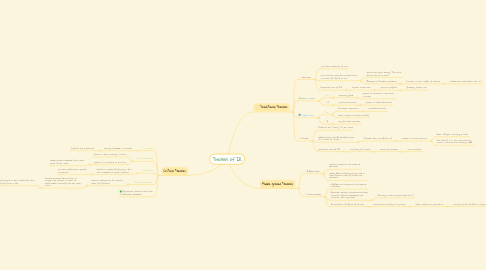
1. Critical theories
1.1. Marxism
1.1.1. society is divided in 2 classes
1.1.1.1. business and proletariat
1.2. Postcolonialism
1.2.1. focuses in the inequality ÷ nations
1.2.2. politics is not limited to one area
1.2.2.1. should include individuals from other parts of the world
1.3. Feminism
1.3.1. focuses on explaining why only a few were involved into power positions
1.3.1.1. how this influenced in political structures
1.4. Poststructuralism
1.4.1. question assumptions of realities taken for granted
1.4.1.1. Jacques Derrida's: deconstruct to analyze and question in order to expose hidden meanings and the power it has
1.4.1.1.1. look beyond an idea and become free of the power it has
1.5. Represents positions that have marginalized individuals
2. Traditional theories
2.1. Liberalism
2.1.1. Main goal: cessation of war
2.1.2. Kant: States with liberal values have no reason for going to war
2.1.2.1. Democratic peace theory: "The more liberal, the more peace"
2.1.2.2. Example: US President Woodrow
2.1.2.2.1. Creation on the League of Nations
2.1.3. Optimistic view of IR
2.1.3.1. improve world order
2.1.3.1.1. peace & progress
2.2. Human nature
2.2.1. L
2.2.1.1. inherently good
2.2.1.1.1. politics are based on cooperation ÷ states
2.2.2. R
2.2.2.1. personal interests
2.2.2.1.1. politics is about domination
2.3. Organisations
2.3.1. L
2.3.1.1. formalize cooperation
2.3.1.1.1. peaceful outcomes
2.3.1.2. assist States in decision taking
2.3.2. R
2.3.2.1. only for self interests
2.4. Realism
2.4.1. Reflects the "reality" of the world
2.4.2. Hobbes: human beings disorganization as a state of nature
2.4.2.1. Provokes "War all against all"
2.4.2.1.1. Solution: a social contract
2.4.3. pessimistic view of IR
2.4.3.1. centrality of States
2.4.3.1.1. security & survival
3. Middle ground theories
3.1. English School
3.1.1. combines elements of realism & liberalism
3.1.2. Hedley Bull: anarchical society with an order based on sharing norms and behaviors
3.2. Constructivism
3.2.1. highlights the importance of values & interests
3.2.2. Alexander Wandt: structures (States) constrain agents (individuals) and constrain their identities
3.2.2.1. "Anarchy is what States make of it"
3.2.3. Interaction of agents of states
3.2.3.1. determines anarchy as a principle
3.2.3.1.1. other States can perceive it
